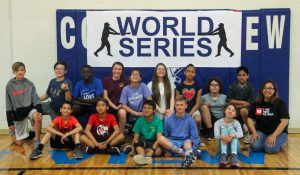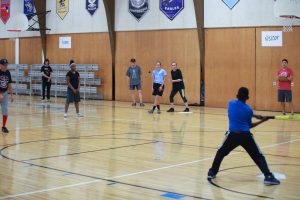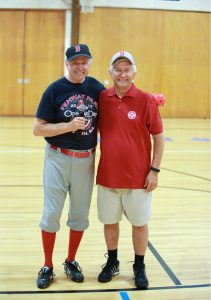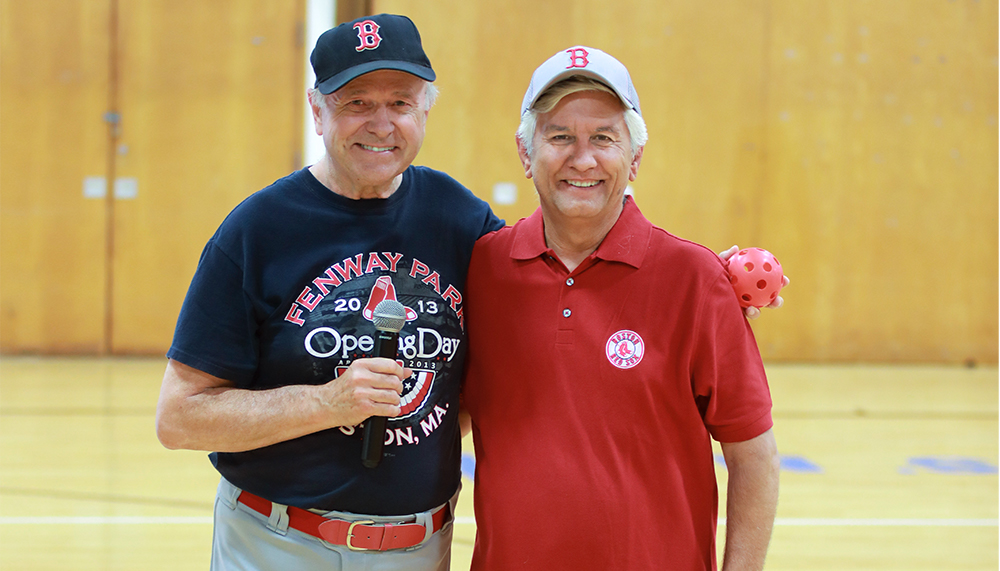Retired pastor Ray Daniel and Gerard Ban, associate director of education for the Mid-America Union, started coordinating World Series baseball games for elementary students in Adventist schools 25 years ago. Today these dedicated professionals are continuing to use the avenue of playing games as a way to reach the hearts of children and youth and help them develop friendships with pastors and other community members that can last a lifetime.
“I’m one thousand percent committed to Adventist Christian education,” says Daniel. “And anything that I can do to enhance it and encourage the teachers and the kids and the school, that’s what I’m trying to do.”
Daniel, who retired in 2014, spent 47 years in ministry, mostly pastoring but also working in administrative positions in several unions. Wherever he has lived—both in active ministry and retirement— he has started a World Series athletic program that runs annually in the spring during the students’ physical education time at school (outdoors when possible) and concludes with a playoff involving coaches, umpires and family members cheering players on. Daniel invites local guests to sing the national anthem and has even had the city mayor come to throw the first pitch.
Something Special
When Daniel came to pastor in South Lancaster, Massachusetts, Gerard Ban and his wife, Martha, were teaching at the Adventist elementary school there. Together the three of them successfully initiated the World Series games for students in grades 5-8 and ran them with support from other teachers and the local community.
Ban, who is starting his 31st year in the field of education, says the World Series impacts the social atmosphere for students and helps them relate better with one another. “It helps break down situations where kids don’t always get along. Playing together is a positive venue. It’s a time to relax and have fun,” he adds. “Students remember things like this. It impacts their lives.”
Daniel describes the World Series as “a fun event to involve the boys and girls in something they could enjoy and get excited about. It helps them get acquainted with a pastor in a different way than just listening to worship talks or seeing them up front in church.” He adds that when parents or community volunteers can umpire or take photos, it helps the kids feel like they’re doing something special. Sometimes a person with a mic sits in the stands and calls the play-by-play. Often Ban comes to represent the Mid-America Union Office of Education and throws out the first pitch. “He always shows up in the right outfit!” says Daniel.
Why Baseball?
Although Daniel played a variety of sports while growing up, he particularly loves baseball. “I got a first baseman’s mitt when I was about 10,” he recalls. “I played in Little League later on as a pitcher. Then I had a dean in academy who was a very good fast pitch softball player. In Massachusetts I pitched for 20 years with a Spanish team of international players. It was a lot of fun.”
Daniel also was the athletic director for camp meetings for a number of years, during which he tried running baseball, football and soccer programs. But Daniel noted that it usually ended up just being soccer matches because many kids were from countries where soccer was “the big deal.”
In addition, Daniel explains that when you play football you have to keep curbing the desire for playing tackle, where there is more of a risk of getting hurt. “When we play baseball outdoors we use an incrediball. It’s a little softer and has enough cushion so if it hits you it doesn’t hurt that bad.”
Ban further points out that baseball is a sport with which most students are familiar. “It’s the American pastime. They’ve had it in PE classes. They can relate to it better than most sports,” he adds.
Daniel wouldn’t mind running a soccer program, he says, especially for grades 1-4. He has also run kickball games for lower grades.
Big Impact
One of the biggest impacts this pastor/educator team sees from their annual World Series games is from people showing sustained interest in their local school. “We have workbees, and some will show up and clean windows and things like that. Those are short-term deals that don’t require much commitment,” says Daniel, although they are appreciated.
The World Series, however, is all about kids spending enjoyable time with their pastor, teacher or other mentor. “They don’t ever forget those times,” Ban declares.
With a chuckle, Daniel observes that very few schools suffer from too much interest in the school. “If we’re not alarmed with what’s going on in Adventist education we ought to be,” he exclaims. “In terms of the loss of schools, we’ve lost academies right here in our union. I held weeks of prayer in these academies that are now defunct. We have to become far more aggressive in promoting Christian education. This is one way I see of doing it, of making these kids happy where they are.”
Big Benefits
Many pastors and educators acknowledge that kids today are too prone to handheld devices, sitting and tapping instead of getting outside for fresh air and physical exercise. While the many benefits of being physically active are well known (for both young and older people), there are also mental health benefits from being able to give without getting anything back. “You can share yourself and share Christ. It’s a positive thing mentally to be able to give to others,” says Ban.
“You get inspired by being around these kids,” adds Daniel. “The enthusiasm with which they embrace the program lifts you up and energizes you. The interaction with the kids is something you can’t purchase. You can’t replace the relationships.”
What does it take to launch this type of program? First it requires a strong interest in Christian education and a willingness from a leader to invest time. “There also needs to be teachers who see the value of how it impacts students down the road,” Daniel says. He always strives for a sense of community involvement by inviting all pastors, church members, parents and other special guests to participate. Daniel’s wife, Bonnie, helps out regularly as well, especially with the celebration at the end where everyone is served cheesecake in plastic ball caps.
One parent who was recently able to help with the World Series at his child’s school said, “Parents are so busy they often don’t have time to visit school. It was nice to see my son having fun with other kids and to have an opportunity outside the classroom to see him develop.”
Photos: Hugh Davis













